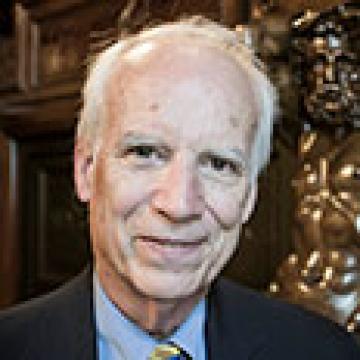Abraham Lincoln: Family Life
The Lincoln family in the White House established a routine of sorts that reflected the presence of their sons, the demands of war, and the highly complex and many-sided character of Abraham and Mary. On a superficial level, the day went from breakfast together as a family at 8:00 in the morning, reunion again for dinner at 8:00 in the evening, and then bedtime. Until little Willie's death in 1862, the two younger sons demanded a good deal of attention, and both parents gave them ample attention, although Lincoln grew more distant as the war progressed and occupied much of his day. It was the general rule of the White House that Mary Lincoln could burst in on her husband without notice to discuss family or politics or whatever was urgently on her mind. In the evening, she read newspapers in anticipation of talking with Abraham when he came to bed about what was newsworthy and to hear his reports on the state of the war. The Lincolns' older son Robert was away from Washington for most of the war either as a student at Harvard or, after 1864, as a young staff officer to General Grant.
Although Lincoln was almost entirely self-educated, he took great pleasure in the study of Shakespeare, Byron, the Bible, Aesop's Fables, and Oliver Wendell Holmes, or any writings with tragic and melancholy themes. Among his favorite poems was Edgar Allen Poe's "The Raven." Lincoln loved to study the great orators, and he labored over his writings, whether they were personal letters or speeches like the Gettysburg Address—which was not quickly composed, as legend suggests, on a slip of paper while traveling by train to Gettysburg. Many of his contemporaries well understood the man's genius. Ralph Waldo Emerson, perhaps the greatest intellectual of the day, ranked Lincoln with Aesop in his lighter moods and among the giants of literature in his more serious moments. "His brief speech at Gettysburg will not," said Emerson, "easily be surpassed by words on any recorded occasion." The great orator Edward Everett, who spoke for two hours at Gettysburg in comparison to Lincoln's two minutes, confided afterwards to the President: "My speech will soon be forgotten, yours never will be. How gladly would I exchange my hundred pages for your twenty lines."
Lincoln was an intensely brooding person, plagued with chronic depression, and gloomy reflections about life and mortality. His poetry, speeches, letters, and conversations were filled with references to death, almost as if he were obsessed by it. He also worried about insanity and feared losing his mind. He never drank after his twenties. Above all else, Lincoln valued logical thought and was intrigued with mathematics. Yet he also was quite superstitious. He looked for signs and visions and believed that dreams were the omens of coming events. Skeptical of organized religion and not a member of any church, he nevertheless believed in an omnipotent God that controlled human destiny.
Known for his humor and folksy anecdotes, he liked to tell all kinds of jokes, bawdy stories, and yarns—usually poking fun at himself. He used his humor to drive home his points, and also as a means of dealing with his depressions. He enjoyed puns, corny jokes, and teasing solemn people. He kidded a group of temperance advocates who came to visit him at the White House by telling them that the Southern soldiers seemed to drink more than his Union bluecoats, wondering if there might be a connection between drinking and Southern valor under fire. Upset with General McClellan's hesitancy to move on Richmond, Lincoln wrote him: "Dear General, if you do not want to use the army I would like to borrow it for a day or two." When he was accused of being two-faced, Lincoln responded: "If I had another face, do you think I would wear this one?"
Other than his jokes, avid reading, swapping stories and gossip with friends and cronies, an occasional game of chess, the theater, and poetry writing, Lincoln enjoyed little else. He detested hunting and did not like participating in group games or structured events if he could avoid them. His greatest relaxation seemed to be in sharing conversation with Mary and Tad Lincoln at the end of the day or when seated together in their carriage rides around the city.
